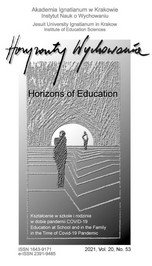Oczy Szeroko Otwarte – obecność projektów edukacyjnych w trzeciej misji uczelni
Eyes Wide Open – the Presence of Educational Projects in the Third Mission of the University
Author(s): Anna Karwińska, Katarzyna Sanak-KosmowskaSubject(s): Higher Education , Sociology of Education
Published by: Uniwersytet Ignatianum w Krakowie
Keywords: the third mission of the university; civic education; socialization; education for the future;
Summary/Abstract: RESEARCH OBJECTIVE: The presented article aims to find an answer to the question of whether and how educational projects addressed to the youngest fit into the Third Mission of the University. THE RESEARCH PROBLEM AND METHODS: In the first part of the article, we review the literature on the subject devoted to the Third Mission of Universities and Civic Education. We pay particular attention to modern universities’ importance for implementing teaching and educational goals that fit into the concept of “education for the future.” The article’s empirical part presents an analysis of a case study – an educational project implemented by the University of Economics in Krakow in 2019-2021. THE PROCESS OF ARGUMENTATION: In the article, we quoted the concept of civic education, in line with the Declaration of the University’s Social Responsibility’s assumptions adopted by 23 Polish universities. We accept the thesis that universities’ participation in building personal and environmental resources of social and civic capital may be implemented as part of projects that fit into the University’s Third Mission. RESEARCH RESULTS: Based on the conducted literature studies and case study analysis, we find that educational projects aimed at school-age children, implemented as part of the 3rd Mission of the University, significantly affect the building of the participants’ “civic capital.” CONCLUSIONS, INNOVATIONS, AND RECOMMENDATIONS: The effects of innovative projects belonging to the area of broadly understood civic education, especially in its moral dimension, are much more challenging to measure than social competencies of a social engineering nature. However, conducting an educational project allows to record changes in the way participants think and act, and thus indirectly evaluate the achieved goals. Among the recommendations, it is worth emphasizing the need to expand the University’s contribution to civic education, especially outside large cities.
Journal: Horyzonty Wychowania
- Issue Year: 19/2020
- Issue No: 51
- Page Range: 69-85
- Page Count: 17
- Language: Polish

